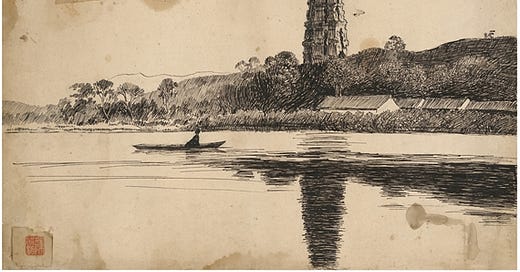The Witching Snakes pt 30
Agatha grows tired of Europe, moves to America, works in Chinatown. She Meets May shortly before May commits Murder. The Last Time She Sees May is in the 1950s At a Bowling Alley.
Read Part 29
Agatha quit soldiers by 1917. They were too disposable. She visited them in their barracks and transformed into mist before the morning. She cried when they fed the maggots. A Chinese laborer who dug the trenches talked to her in mandarin. She responded in older dialects. Words went astray. She did not love him. Yet he called out to her after the day. They remained in camp. He spoke of the dead Qing and the emerging China. He did not love the Qing, hated the empress dowager; yet respected her for killing the last emperor. The new reformers lurked in offices - suspicious and greedy.
Agatha and her laborer spent many nights together. He thought his days were determined and the number of his months were no more than three. Waters fall from the sea and the blood soaked the grass. He had read the classics and he sang the old songs. She did not ask if he knew her story; he would have laughed had she told him that she was the snake that had been banished to the Leifeng Pagoda so many centuries ago. It was a story of fear and anger, so widely known that she might as well have announced that she was the Monkey King or the Yellow Emperor. His name was Peng. She called him Xu in the lonely hours; he was fine with that.
One day he was on a train back to Shadong. His family was sick, he said. His wife was sick. He had not told Agatha that he had married. She didn't know if that was an issue. After he left, she tried to ask about him, but his friend hated her.
In 1918, she had jumped on a cruise ship with other Europeans. Because of the Lusitania, travel prices were cheap. Everyone was eager to leave. They were all very wealthy and slightly nauseous. The crew pointed out the lifeboats. Agatha wanted to fall in love but the most promising lover was a woman in her eighties who showed Agatha her collection of cat postcards. The woman was an heiress from a family of wine merchants or button makers. Her family business was doing very well that season. Agatha liked her and loved her struggles. Agatha was afraid to kiss her.
So they spent the voyage talking about cats and herbal tea. They compared children. Agatha did not care for the woman's husband. He sounded awful. On the deck, the band played Dixieland Jazz.
Keep reading with a 7-day free trial
Subscribe to Existential Angst and Plushies - Tim Lieder's Substack to keep reading this post and get 7 days of free access to the full post archives.




